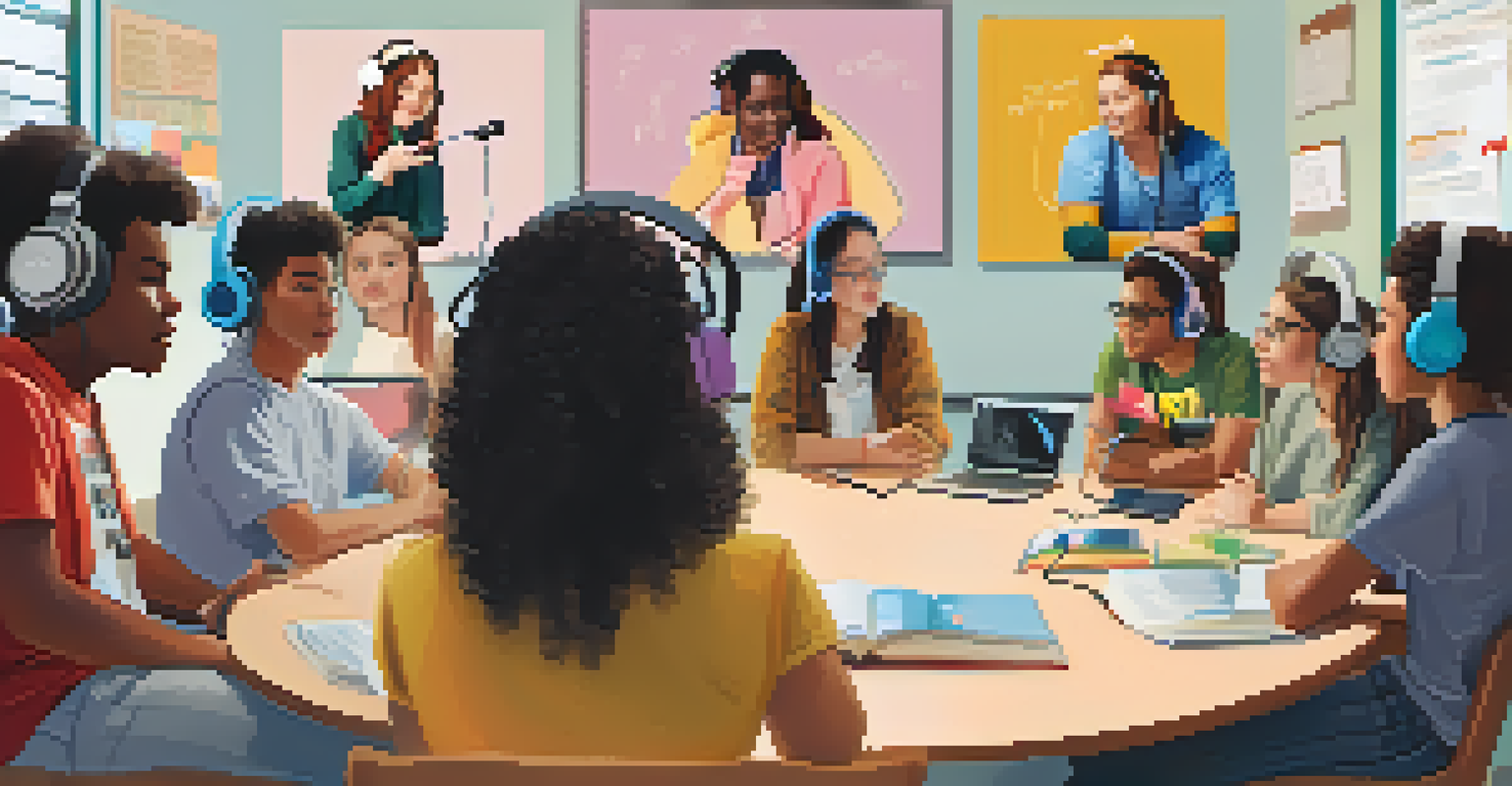Utilizing Podcasts as Educational Tools in Remote Learning

Understanding the Role of Podcasts in Education
Podcasts have emerged as a versatile tool in the educational landscape. They provide a platform for experts to share insights, making complex topics more accessible. Their audio format allows learners to absorb information during multitasking, such as commuting or exercising.
Podcasts are a great way to engage learners and provide them with the flexibility to learn on their own terms.
In remote learning environments, podcasts offer a unique way to engage students who may struggle with traditional formats. The informal nature of podcasts helps create a relaxed learning atmosphere, encouraging students to explore topics at their own pace. This flexibility caters to diverse learning styles and preferences.
Furthermore, podcasts can foster a sense of community among learners. By sharing experiences and insights, students can feel connected, even when physically apart. This connection can enhance motivation and create a more supportive learning environment.
Benefits of Using Podcasts in Remote Learning
One major benefit of podcasts is their ability to enhance listening skills. As students listen to various speakers, they learn to differentiate tones, accents, and styles of communication. These skills are crucial not only in academics but also in real-world interactions.

Podcasts also promote critical thinking. When students engage with thought-provoking content, they are encouraged to analyze and form their own opinions. This process nurtures intellectual curiosity, prompting learners to dive deeper into subjects that interest them.
Podcasts Enhance Learning Flexibility
Podcasts provide a versatile platform that allows students to engage with educational content at their own pace and in various settings.
Additionally, the portability of podcasts allows students to learn on the go. Whether they’re taking a walk, cooking, or commuting, they can easily access educational content. This convenience makes it easier for busy learners to integrate learning into their daily routines.
Selecting the Right Podcasts for Your Curriculum
Choosing the right podcasts is crucial for maximizing their educational potential. Start by identifying the learning objectives you want to achieve. This will guide you in selecting podcasts that align with your curriculum and address specific topics.
Education is not the filling of a pail, but the lighting of a fire.
Consider the credibility of the podcast hosts and the depth of content they provide. Look for podcasts featuring experts or educators in the relevant field, as their insights will be more valuable. Additionally, review episodes for clarity, relevance, and engagement to ensure they resonate with your students.
Don't forget to involve students in the selection process! Allowing them to suggest or choose podcasts can boost their engagement and investment in the material. When learners have a say in what they consume, it fosters a sense of ownership over their education.
Integrating Podcasts into Your Lesson Plans
Integrating podcasts into lesson plans can be a creative way to enhance learning. Start by assigning specific episodes as homework and encourage students to reflect on the content. This can lead to rich discussions during synchronous sessions, where learners can share insights and questions.
You might also consider using podcasts as a launching point for projects or research assignments. For example, after listening to an episode on climate change, students could explore related topics, conduct their own research, and present findings. This approach not only reinforces the podcast content but also encourages exploration beyond the audio.
Critical Thinking Through Listening
Engaging with thought-provoking podcast content promotes critical thinking and encourages students to form their own opinions.
Additionally, consider incorporating podcasts into various teaching styles. Whether through individual listening, group discussions, or multimedia presentations, you can cater to different learning preferences. This variety keeps students engaged and helps reinforce the material in diverse ways.
Creating Your Own Educational Podcasts
Creating your own educational podcasts can be an exciting and innovative project. It allows educators to share expertise and customize content to fit their students' needs. By tapping into your own knowledge, you can offer unique insights that resonate with your learners.
Involving students in the podcast creation process can enhance their learning experience. They can research topics, write scripts, and even participate as speakers. This hands-on approach fosters teamwork and the development of communication skills while deepening their understanding of the subject matter.
Moreover, sharing your podcast with a wider audience can foster a sense of community beyond the classroom. Other educators and students may benefit from your content, creating a network of shared knowledge and resources. This not only enriches your teaching experience but also contributes to the broader educational landscape.
Measuring the Impact of Podcasts on Learning Outcomes
To understand the effectiveness of podcasts in your teaching, it's important to measure their impact on learning outcomes. Start by collecting feedback from students about their listening experiences. This can provide insights into content relevance and engagement levels.
You can also assess students’ understanding through quizzes or discussions based on podcast material. Observing improvements in their comprehension and critical thinking skills can help evaluate the podcasts’ effectiveness. Tracking these changes over time will give you a clearer picture of their educational value.
Involving Students Boosts Engagement
Allowing students to participate in selecting and creating podcasts fosters a sense of ownership and enhances their learning experience.
Finally, consider adjusting your podcast selections and integration strategies based on this feedback. Continuous improvement is key in education, and adapting your approach can significantly enhance learning experiences. By staying responsive to student needs, you can ensure that podcasts remain a valuable educational tool.
Challenges and Considerations of Using Podcasts
While podcasts offer many benefits, there are challenges to consider in remote learning settings. One significant concern is accessibility; not all students may have reliable internet access or the necessary devices to engage with audio content. It’s important to ensure that all students can participate equally.
Another challenge is ensuring that students stay focused while listening. Unlike traditional reading, audio content can sometimes lead to distractions. To combat this, consider implementing listening guides or structured activities that require students to actively engage with the material.

Lastly, it's essential to stay updated on podcast quality and content. The podcast landscape is vast, and not all content is created equal. Regularly reviewing the podcasts you incorporate ensures that they remain relevant, credible, and engaging for your students.